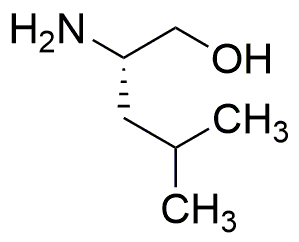L-Leucinol is widely utilized in research focused on:
- Pharmaceutical Development: This compound serves as a building block in the synthesis of various pharmaceuticals, particularly in creating amino acid derivatives that can enhance drug efficacy.
- Biotechnology: L-Leucinol is used in the production of biopolymers and as a substrate in fermentation processes, aiding in the development of bio-based materials.
- Food Industry: It acts as a flavor enhancer and nutritional supplement, providing essential amino acids that support dietary needs, especially in protein-rich formulations.
- Cosmetic Applications: The compound is incorporated into skincare products for its moisturizing properties, helping to improve skin hydration and texture.
- Agricultural Science: L-Leucinol is explored for its potential in plant growth regulation, promoting healthier crop yields and enhancing resistance to environmental stressors.
General Information
Properties
Safety and Regulations
Applications
L-Leucinol is widely utilized in research focused on:
- Pharmaceutical Development: This compound serves as a building block in the synthesis of various pharmaceuticals, particularly in creating amino acid derivatives that can enhance drug efficacy.
- Biotechnology: L-Leucinol is used in the production of biopolymers and as a substrate in fermentation processes, aiding in the development of bio-based materials.
- Food Industry: It acts as a flavor enhancer and nutritional supplement, providing essential amino acids that support dietary needs, especially in protein-rich formulations.
- Cosmetic Applications: The compound is incorporated into skincare products for its moisturizing properties, helping to improve skin hydration and texture.
- Agricultural Science: L-Leucinol is explored for its potential in plant growth regulation, promoting healthier crop yields and enhancing resistance to environmental stressors.
Documents
Safety Data Sheets (SDS)
The SDS provides comprehensive safety information on handling, storage, and disposal of the product.
Product Specification (PS)
The PS provides a comprehensive breakdown of the product’s properties, including chemical composition, physical state, purity, and storage requirements. It also details acceptable quality ranges and the product's intended applications.
Certificates of Analysis (COA)
Search for Certificates of Analysis (COA) by entering the products Lot Number. Lot and Batch Numbers can be found on a product’s label following the words ‘Lot’ or ‘Batch’.
*Catalog Number
*Lot Number
Certificates Of Origin (COO)
This COO confirms the country where the product was manufactured, and also details the materials and components used in it and whether it is derived from natural, synthetic, or other specific sources. This certificate may be required for customs, trade, and regulatory compliance.
*Catalog Number
*Lot Number
Safety Data Sheets (SDS)
The SDS provides comprehensive safety information on handling, storage, and disposal of the product.
DownloadProduct Specification (PS)
The PS provides a comprehensive breakdown of the product’s properties, including chemical composition, physical state, purity, and storage requirements. It also details acceptable quality ranges and the product's intended applications.
DownloadCertificates of Analysis (COA)
Search for Certificates of Analysis (COA) by entering the products Lot Number. Lot and Batch Numbers can be found on a product’s label following the words ‘Lot’ or ‘Batch’.
*Catalog Number
*Lot Number
Certificates Of Origin (COO)
This COO confirms the country where the product was manufactured, and also details the materials and components used in it and whether it is derived from natural, synthetic, or other specific sources. This certificate may be required for customs, trade, and regulatory compliance.


